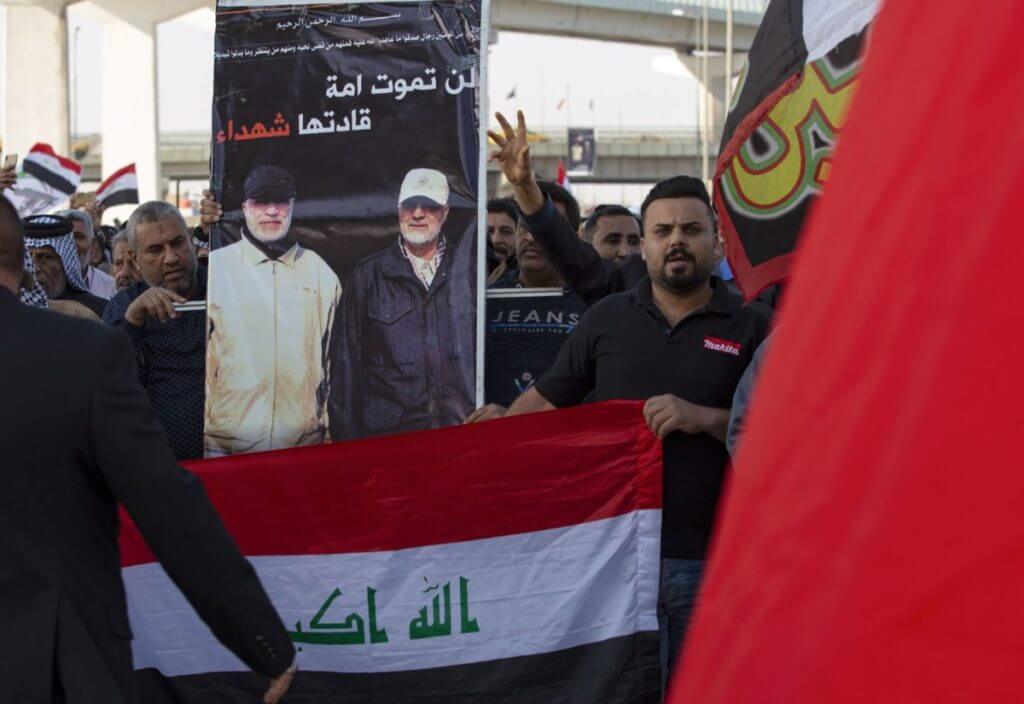Oil Prices Swing Wildly as Trump’s Sanctions Threat Against Iraq Likely to Backfire

Iraq has voted to expel U.S. forces from the country following the assassination of Iranian General Qassem Soleimani. The assassination could backfire against the Trump administration as Iraq pivots closer to Iran. | Image: Hussein FALEH / AFP
- Crude prices remain extremely volatile as Mideast tensions reverberate.
- President Trump’s threat to slap Iraq with sanctions could backfire on the United States as crude supplies dry up.
- U.S. inventory data show a surprise build up in commercial stockpiles last week.
The price of oil corrected sharply lower on Wednesday, as investors weighed President Trump’s threat to slap Iraq with punishing sanctions for siding with Iran in what appears to be a growing regional conflict.
Crude Corrects Lower Following Initial Spike
President Trump’s assassination of Iranian General Qassem Soleimani sent oil prices soaring earlier this week. The West Texas Intermediate (WTI) benchmark for U.S. crude futures peaked at $65.65 a barrel on Wednesday, a new 52-week high, according to Bloomberg data.

The futures contract has since given back all of its gains and is sitting on a loss of 4%. It last traded at $60.13 a barrel on the New York Mercantile Exchange.
Brent crude, the international futures contract, peaked at $71.75 a barrel, the highest since October 2018. It was last down 4.1% at $65.50 a barrel on London’s ICE futures exchange.
Oil prices swung lower after the U.S. Energy Information Administration (EIA) reported a surprise build up in commercial crude inventories last week. Stockpiles rose 1.164 million barrels in the week ended Jan. 3, confounding expectations of a 3.572 million-barrel drop.
Trump Threatens Iraq With Sanctions
Commodity markets were on edge Wednesday after Iran fired more than a dozen ballistic missiles at two U.S. military bases in Iraq. The missile attack was launched days after President Trump ordered the assassination of General Qassem Soleimani, the head of Iran’s powerful Quds Force.
The attack on Soleimani also killed Abu Mahdi al-Muhandis, a leader of Iraq’s Popular Mobilization Forces. It didn’t take long for Iraq’s parliament to convene, with officials voting to expel U.S. troops from the country. President Trump responded by threatening Iraq with economic sanctions.
“It’ll make Iranian sanctions look somewhat tame,” Trump told reporters aboard Air Force One, according to CNN .
Sanctions on Iraq would likely limit the country’s ability to export oil, a move that would further exacerbate the global supply crunch. Sidelining one of the world’s largest energy producers could spark fears of a major supply shortage, sending prices even higher.
With the U.S. presidential election a mere ten months away, Trump is unlikely to follow through on his sanctions threat.
Iran Notifies Iraq of Missile Attack
Not only has Iraq voted to expel U.S. troops from its territory, it appears to be working even closer with Iran following Soleimani’s death.
Baghdad confirmed Wednesday that it was notified by Iran that the missile attack on U.S. bases was imminent.
U.S. officials said they too had advance warning of the missile attack . The warning allowed American troops to scurry to safety before the missiles rained down on the al Assad airbase in Iraq’s Anbar province. President Trump has since confirmed that no American lives were lost as a result of the attacks. As The Wall Street Journal reports , the president hasn’t signaled for further military strikes, a sign that he was backing away from the conflict.
Iran’s growing influence in Iraq since the U.S.-led invasion in 2003 could complicate Trump’s effort to de-escalate the conflict. With Soleimani at the helm, Iranian forces were integral to defeating ISIS inside Iraq. Tehran controls several militias within the Arab territory and maintains vast influence over religious affairs.